#Global Future
Text
Hey, happy Earth Day! Who wants to talk about climate change?
Yeah, okay, fair, I kinda figured the answer to that would be "ugh do we have to?" What if I told you I have good news though? Good news with caveats, but still good news.
What if I told you that since the Paris Agreement in 2015, we've avoided a whole degree celsius of global warming by 2100, or maybe more?

Current projections are 2.7C, which is way better than the 3-5C (with a median of 3.7C) we were expecting in 2015. It's not where we want to be - 1.5C - but it is big, noticeable progress!
And it's not like we either hit 1.5C and avoid all the big scary consequences or fail to hit 1.5C and get all of them - every tenth of a degree of warming we avoid is going to prevent more severe problems like extreme weather, sea level rise, etc.
This means that climate change mitigation efforts are having a noticeable impact! This means a dramatically better, safer future - and if we keep pushing, we could lower the amount of global warming we end up with even further. This is huge progress, and we need to celebrate it, even though the fight isn't over.
It's working. Keep going.
#hylian rambles#climate change#climate crisis#environmental issues#global warming#hope#hope for the future#hope for the planet#earth day
10K notes
·
View notes
Photo

The South China Sea is an ancient gateway between East and West, between civilizations, between dreams and nightmares. It is a place where, for centuries, fate has been decided during heated showdowns. Overflowing with uncertainty and potential for tragedy, the area is buzzing with secrets and forces unseen by the human eye. Perhaps it is time to pay attention to what is unfolding in the depths of this body of water, lest we all pay the price for our blindness.
0 notes
Text
Yes, we’ve breached 1.5 degrees (at least annually). That doesn’t mean the world is ending or the fight is over. It means we have to redouble our efforts. Every fraction of a degree matters for coral reefs, for low-lying islanders, for the ice caps, for our unborn descendants. Take some time to grieve, then roll up your sleeves and get back into the work.
#solarpunk#hopepunk#environmentalism#cottagepunk#social justice#community#optimism#bright future#climate justice#tidalpunk#lunarpunk#turbinepunk#climate change#global warming#activism
546 notes
·
View notes
Text
No-paywall version.
"You can never really see the future, only imagine it, then try to make sense of the new world when it arrives.
Just a few years ago, climate projections for this century looked quite apocalyptic, with most scientists warning that continuing “business as usual” would bring the world four or even five degrees Celsius of warming — a change disruptive enough to call forth not only predictions of food crises and heat stress, state conflict and economic strife, but, from some corners, warnings of civilizational collapse and even a sort of human endgame. (Perhaps you’ve had nightmares about each of these and seen premonitions of them in your newsfeed.)
Now, with the world already 1.2 degrees hotter, scientists believe that warming this century will most likely fall between two or three degrees. (A United Nations report released this week ahead of the COP27 climate conference in Sharm el Sheikh, Egypt, confirmed that range.) A little lower is possible, with much more concerted action; a little higher, too, with slower action and bad climate luck. Those numbers may sound abstract, but what they suggest is this: Thanks to astonishing declines in the price of renewables, a truly global political mobilization, a clearer picture of the energy future and serious policy focus from world leaders,
we have cut expected warming almost in half in just five years.
...Conventional wisdom has dictated that meeting the most ambitious goals of the Paris agreement by limiting warming to 1.5 degrees could allow for some continuing normal, but failing to take rapid action on emissions, and allowing warming above three or even four degrees, spelled doom.
Neither of those futures looks all that likely now, with the most terrifying predictions made improbable by decarbonization and the most hopeful ones practically foreclosed by tragic delay. The window of possible climate futures is narrowing, and as a result, we are getting a clearer sense of what’s to come: a new world, full of disruption but also billions of people, well past climate normal and yet mercifully short of true climate apocalypse.
Over the last several months, I’ve had dozens of conversations — with climate scientists and economists and policymakers, advocates and activists and novelists and philosophers — about that new world and the ways we might conceptualize it. Perhaps the most capacious and galvanizing account is one I heard from Kate Marvel of NASA, a lead chapter author on the fifth National Climate Assessment: “The world will be what we make it.” Personally, I find myself returning to three sets of guideposts, which help map the landscape of possibility.
First, worst-case temperature scenarios that recently seemed plausible now look much less so, which is inarguably good news and, in a time of climate panic and despair, a truly underappreciated sign of genuine and world-shaping progress...
[I cut number two for being focused on negatives. This is a reasons for hope blog.]
Third, humanity retains an enormous amount of control — over just how hot it will get and how much we will do to protect one another through those assaults and disruptions. Acknowledging that truly apocalyptic warming now looks considerably less likely than it did just a few years ago pulls the future out of the realm of myth and returns it to the plane of history: contested, combative, combining suffering and flourishing — though not in equal measure for every group...
“We live in a terrible world, and we live in a wonderful world,” Marvel says. “It’s a terrible world that’s more than a degree Celsius warmer. But also a wonderful world in which we have so many ways to generate electricity that are cheaper and more cost-effective and easier to deploy than I would’ve ever imagined. People are writing credible papers in scientific journals making the case that switching rapidly to renewable energy isn’t a net cost; it will be a net financial benefit,” she says with a head-shake of near-disbelief. “If you had told me five years ago that that would be the case, I would’ve thought, wow, that’s a miracle.”"
-via The New York Times Magazine, October 26, 2022
#climate change#global warming#renewable energy#climate anxiety#climate crisis#humanity#green energy#green future#apocalypse#natural disasters#good news#hope#research#hope posting
2K notes
·
View notes
Text
Two men who were instrumental in creating a global seed vault designed to safeguard the world's agricultural diversity will be honoured as the 2024 World Food Prize laureates.
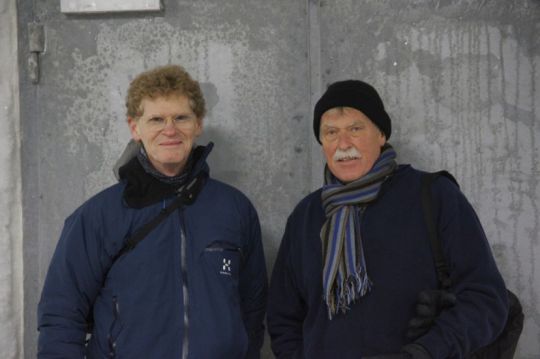
Cary Fowler, the US special envoy for Global Food Security, and Geoffrey Hawtin, an agricultural scientist from the UK and executive board member at the Global Crop Diversity Trust, will be awarded the annual prize and split a $500,000 (€464,000) award. In 2004, Fowler and Hawtin led the effort to build a backup vault of the world's crop seeds in a place where it could be safe from political upheaval and environmental changes.
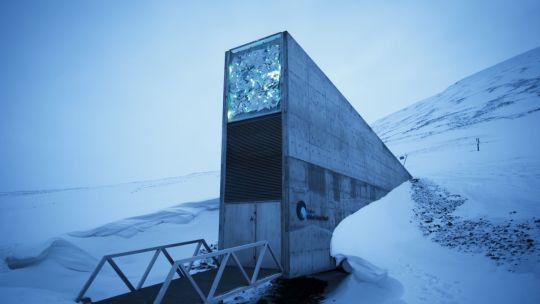
The facility was built into the side of a mountain on a Norwegian island in the Arctic Circle where temperatures could ensure seeds would be preserved.
The Svalbard Global Seed Vault - also known as the 'Doomsday vault' - opened in 2008 and now holds 1.25 million seed samples from nearly every country in the world.
#solarpunk#solar punk#indigenous knowledge#community#reculture#seed vault#svalbard#global food prize#preserving the future
153 notes
·
View notes
Text
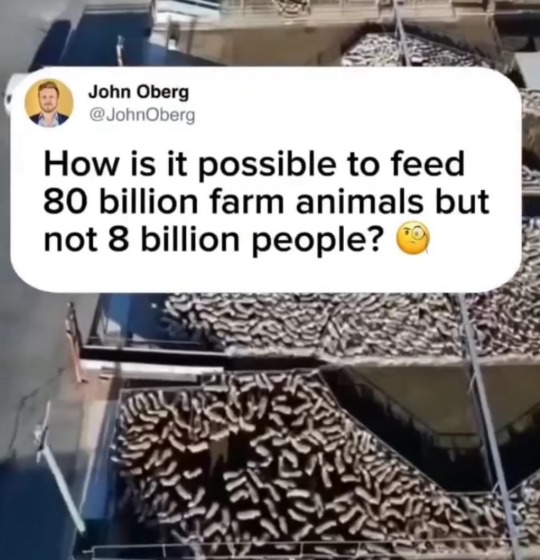
Feed humanity, not global warming.
Veganism is the only healthy and sustainable solution for world hunger. Yet we keep paying farmers to continue the extortion of animals for their flesh to result a large quantity of nutritional food into a small amount of wasteful steak.
Taste is no longer an argument, as humans have already achieved the taste of meat through plantbased alternatives.
If you’re truly concerned for human rights, world hunger and want to contribute to the solution instead of adding to the problem subconsciously.. go choose veganism today.
🌱 x 🌍 x 🫀
#think about it#world hunger#hunger#poverty#go vegan#vegan tweets#solution for the future#vegan for human rights#human rights#feed humanity not global warming
77 notes
·
View notes
Text
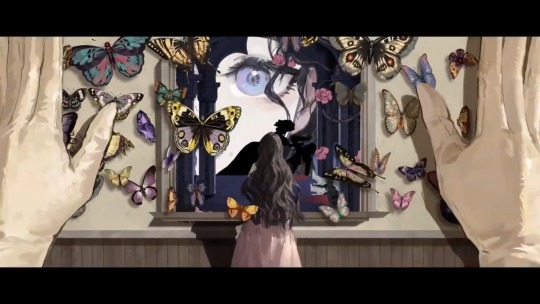
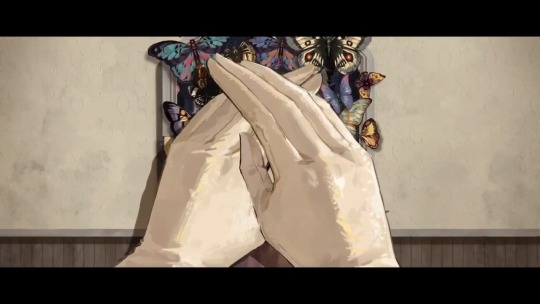
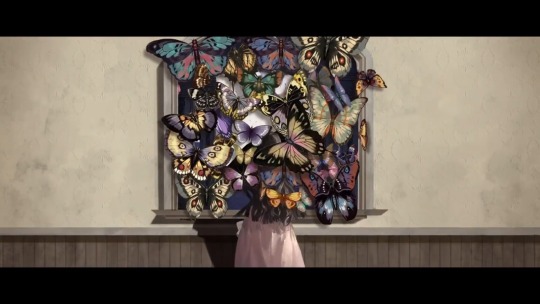



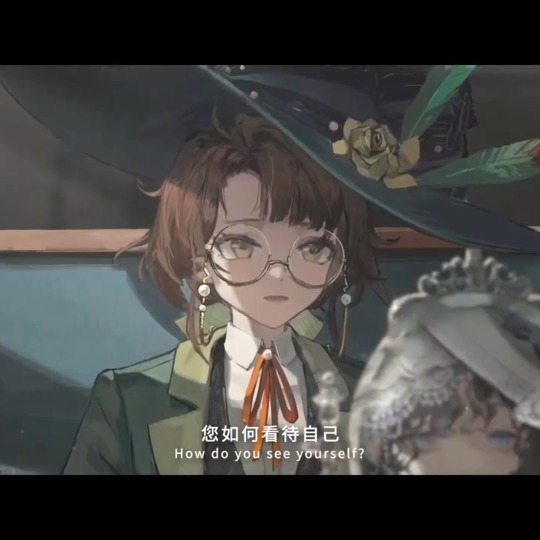

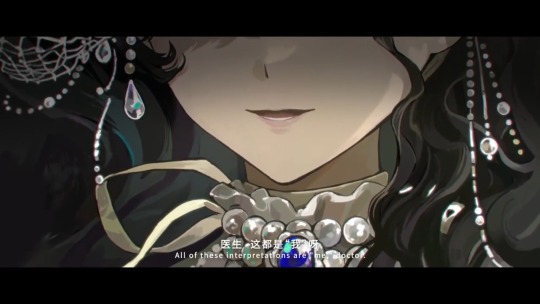
ISOLDE THE WOMAN YOURE-
#reverse 1999#isolde#re1999#r1999#im future isolde haver#sometimes i hate that global and cn server have different patch time#i mean the cn server content far ahead the global means i can plan my pulls but#i want to play 1.7 so baddddd
106 notes
·
View notes
Text
I know everyone is reading into the characterisation brought by the masks in Glass Onion, but I love how these clues rely entirely on the audiences shared experiences and connotations made from living during covid. It makes the film so personal, I think.
#the fact that a few years ago or several years in the future no one will get the same experience as those watching it now#everyone knew a Claire or a duke during the pandemic which helps form our ideas about the characters#and that extra layer of understanding will be lost on someone who has never experienced covid#I don’t know I just thought it was neat#and a cool exploration into how covid has collectively shaped us and changed the way we experience the world and cinema#Great encorporation of a global pandemic as a storytelling device that would be incomprehensible to me a few years ago#I saw Blancs funky little dotted mask and I knew he was both dapper and fruity#character development at its finest#also props to the costume team honestly#glass onion#knives out#benoit blanc#mystery#film#movie
679 notes
·
View notes
Text
The Dystopia That Made Trigun
Ya'll the problem with Triguns insanely long speculative sci-fi timeline is the conundrum of trying to imagine exactly how a dystopian Earth could get so bad that massive amounts of folks needed to yeet themselves blindly into space, but could become so advanced that they single-handedly solve the energy crisis and maybe confirm the existence of god at the same time.
I am not a very skilled dystopia engineer, and there are a lot of flavors but I'd like to think the revolution of Plants on Earth has the potential to alleviate a lot of the aggregators in a full (or seemingly imminent) societal collapse. I'm struggling to work ahead of late-stage capitalism doomer scenarios right now which maybe puts me at a century out. I'm placing Trigun's timeline at 5 centuries out, But the tech advancement can pause at like 3 centuries in since 2 of those are used for space travel before the Big Fall.
So let's hash this out together
Here's what advancements Project Seeds needs to launch:
bioengineering (prosthetics and augmentations)
cloning and gene editing capabilities
cryosleep technology
advanced space travel
gravity control
supercomputing
Here's the rough and estimated environmental factors to cause them to leave Earth:
Resource scarcity
Environmental decline (like global warming and loss of land, and mass extinction)
[speculative] imminent doom from societal factors [like nuclear war and geopolitical unrest]
We know based on the society formed on No Man's Land that capitalism is probably the most familiar and default system used by the immigrants. So we can assume that Project Seeds was created with wealthy benefactors at the helm not only looking for salvation but probably power and influence (cause capitalism gonna a capitalism)-- a true colonial expansion echo despite the optimism.
The Seeds Project strikes me as unaffiliated with a specific country or culture. JuLai and some of the ambiguous ethnicities and lingering languages suggest that it's multi-cultural with English being the primary influence. So it's not a state-sponsored project, but very likely independent-- another point to the wealthy benefactor line of thought. Despite that, those shuttles alone took decades to construct and governmental cooperation to launch so it couldn't have been a completely apolitical endeavor.
Then there's the population. The project's reach is insane, not just in talent, but passenger interest. I'm assuming children were not on board, so you are talking about countless able-bodied adults abandoning their lives knowingly for the promise of a better world. The environmental factors aside, the prep-time for the project had to have been decades in the making. That's a long time to keep the propaganda circling for the promise of better. That kind of interest fades as people age into different stages of life. (Depending on the scenarios we could be looking at a mass draft? Unlikely but very interesting). We know that the survivors of the Big Fall were not specifically tailored to create a society without the comforts they were bringing along or the government of No Man's Land would look a little more stable.
So, what kind of society could form such a vast space immigration project while simultaneously on the verge of collapse?
Well, a desperate one.
The logic follows that as the resources grow scarce and the inequality gaps create vast populations of suffering among disenfranchised people-- fascism rises, which broadly stymies innovation. It's a real roadblock to this scenario. So the jumpstart out of this would be either war or a scientific breakthrough-- or both. There's always going to be interest and innovation in DNA science as a part of the medical field. Even in heavy capitalism that is going to get a lot of money thrown at it. The only thing needed to create Plants is large leaps in gene editing and cloning.
I'll throw out a number, 50 years. We've got cloning and Jurassic Park stuff. Then boom. Angel Mummy discovery. Scientists create the First Entity. But at the same time, geopolitical tensions ramp up because of the destructive potential of this entity. (I mean the First Entity has the Drain ability, that's black hole powers. We're getting wars). But the Plants are developed off of that and the First Entity is destroyed in the Julai foreshadowing lab accident many years down the line. --We've solved the energy crisis and there is probably a huge boom in advancement-- probably those physic-defying advancements to boot. But we have our militaristic flashpoint in technological prosperity, all while the earth is raining hellfire, the cities are flooding, and mass extinction events are occurring. Enough to get Trillionaires with savior complexes to start making Project Seeds.
Aaaand they are probably funding the countless wars so people join the expedition.
Conclusion: Project Seeds is a corrupt colonial project manipulating the hopeful desperation of a beleaguered population, created by the ultra-wealthy to garner absolute control in a humanity reset.
Good thing Nai crashed the ships!
#trigun#trigun stampede#trigun stargaze#trigun meta#this is me trying to work out the highs and low while overcoming the despair of imminent doom the future gives me#like i kept thinking#at this rate they wont have the tech to make the plants how do i realistically imagine that happening#but humanity always finds a way and when the narrative wants to collapse a century into the scenario#you throw an act of god in aka the plants#the only sticking factor i still have is the globalization question#I think I was sticking on a world government scenario funding the seeds project but it makes more sense that its a private venture#though it seems too big for a government to ignore not to mention the sovereignty questions within the expedition.#Who knows what kind of politics that led to towards the launch#anyway please tell me your Trigun Earth dystopia headcanons I feel out of my depth imagining scenarios.
23 notes
·
View notes
Text
Watched the first 6 episodes of Hailey's On It on Disney+ and thought, "If Hailey's big thing in the future is that she reverses global warming and saves the world, why would someone try to stop her?" and then the rich white kid with an inferiority complex showed up and I went, "Ah, that makes sense."
#hailey's on it#yeah I'm 99.9% sure AC is the one sending robots from the future to stop her#purely so that HE can (theoretically) step in to be the savior instead and get all the praise#I don't think he wants to world to end I think he wants to take her place#or he's so jealous he doesn't even care as long as she fails#btw my evidence is#1. Someone aiming for the glory or wanting Hailey to suffer is the only thing that makes sense to me#for why someone would go to the length of sending robots back in time to stop global warming being solved#2. They are tiny helper robots. What did AC have when he was introduced? Tiny helper robots#3. They're called Chaos bots. In the escape room episode AC says the god Set is both the god of chaos and someone he admires
138 notes
·
View notes
Photo

As the world watches a potential showdown in the South China Sea, few are paying attention to the real stakes at play. At the heart of the matter is a battle for control of the global future. Whoever controls the South China Sea will control the flow of billions of dollars in trade each year. They will also have a strategic advantage in the region, allowing them to project power and influence in a way that no other country can. This is a battle for the future, and it's one that we can't afford to lose.
0 notes
Text
One thing I adore about PB is Tommy's approach towards modernity. Straddling the non-industrial past and the industrial/modern present; constantly positioning himself on the cutting edge, if not quite bleeding edge, of period/era technology. Cars, manufacturing, shipping, phones, typewriters. Medicine, psychology, and even bringing in incredibly modern concepts into politics in that era. He is constantly grabbing at the future. It's this striking characteristic in him, all the way from S1 when they install the phone in the Garrison - ~if only we knew someone else with a phone, we could call them~ - through to S6's final episode when he even wangles a seat on an airplane to get to Canada without wasting time. So uncommon at the time, but he just went: I need to get there with least time lost, and matched requirement to a borderline experimental non-consumer-available insider technology to do so.
(Sidestep: Such an interesting juxtaposition of all that, with the constant representation of the pre-industrial-era Romani threads in S6, too: Esme, the hills, the horse, the curse, the mythology, the vardo, all that slamming up against an actual cutting edge submachinegun, so ‘contemporary’ it’s actually anachronistic by a few years (if my research was right, it’s a WWII weapon that submachinegun, not to get on the symbolism, but). Arguably, Ruby in hospital having the most contemporary medical treatment available while Tommy goes walkabout to lift a curse is another notable juxtaposition.
There’s also an interesting slant of his modernity balanced against what I call his hoarding habit — the most cutting edge piece of tech or modernity in 1923 he’s still hanging onto in 1933. But yeah, even with that the juxtapositions are interesting because they can only happen if the forward reaching/modernity focus is there)
So, when I see contemporary-modern!AU takes of Tommy that are like, representing him as a relatively humdrum part of the capitalist consumer status quo, or even as a luddite who can't and won't use an Iphone, I scratch my head. I do think he’s *not* much of an innovator, but he is absolutely a considered first-gen adopter and recognises (and takes) opportunity regarding tech innovation with little concern for risk.
I have contemplated would rich modern!AU Tommy with disposable income finance startups if they pitched well: probably yes, because he takes gambles; with a personally vested interest in the innovators in the same way he had that vested interest in Bonnie. Startups as horses or boxers on a diff playing field, win some, lose some, etc.
#There’s also how modern Tommy is probably a weapons trafficker of some sort too#but can still scratching at how it all translates#Only bothers w illegal drugs because breaking into the international pharmacology cartel is too hard#The thing that really changes in contemporary era is the ease of global reach. Tommy was an innovator in the 20/30s because he looked globa#As soon as he could#from his class-bound ethnically diverse neighbourhood. Internationality was always there but it was a difference#Compared to now global reach is more the norm not the innovation#Anyway modern AU Tommy is interesting because representing that ‘future reach’ he shows in the 1920s rarely seems to be explored…#Another part of this thinking is me wondering *why* I keep seeing in-my-head-contemporary!Tommy in Japan on business trips#think it’s something to do with the same interesting juxtaposition of the pre industrial traditionality with bleeding-edge in Japan
17 notes
·
View notes
Text

“DO NOT, MY FRIENDS, BECOME ADDICTED TO WATER. IT WILL TAKE HOLD OF YOU AND YOU WILL RESENT ITS ABSENCE.”
#global water shortages#dire future of planet earth#mad max fury road#immortan joe#unquenchable thirst
10 notes
·
View notes
Text
my book of poetry, grit, is getting close to 400 reviews on goodreads! thinking i might list some signed copies in my shop when it gets there? you can read it here for free!
93 notes
·
View notes
Text
It is not a coincidence that the legacy of five hundred years of settler colonialism, genocide, slavery, apartheid, and systemic racial discrimination is climate change, mass extinction, desertification, deforestation, and the increasing toxicity of the air, water, and land. They demonstrate a shared desire to control and eliminate that which is feared in the human and non-human world – the unknown and the unknowable – through either assimilation or extermination.
— Usha Natarajan, "Accepting the Unknown" in "Radical Imagining of ‘Just & Green’ Futures."
Follow Diary of a Philosopher for more quotes!
#Usha Natarajan#Accepting the Unknown#Radical Imagining of ‘Just & Green’ Futures#quote#quotes#climate#dark academia#gradblr#studyblr#climate change#climate crisis#climate action#climate justice#climate solutions#environmental justice#environment#extinction#global warming#colonialism#colonisation#apartheid#slavery#genocide#racial discrimination#deforestation#nature#settler colonialism
14 notes
·
View notes
Text
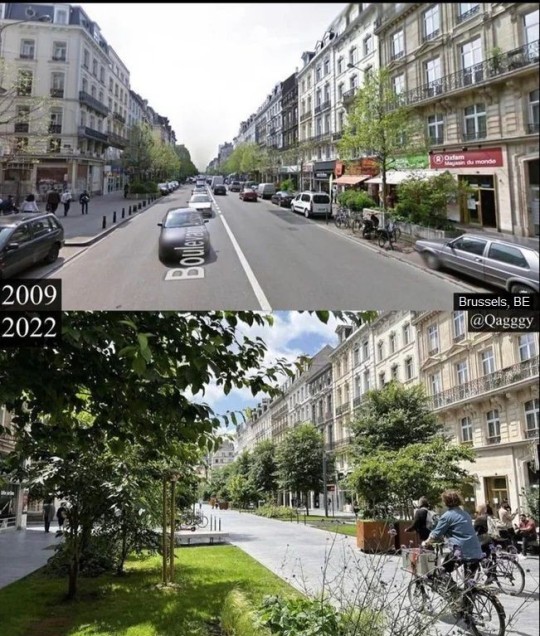

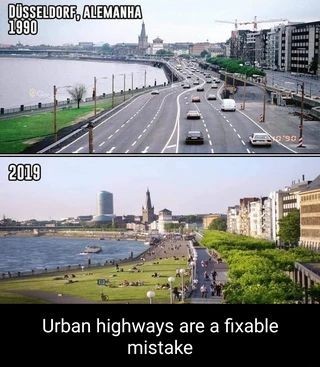
This is a good idea. We should all copy.
I hate over developed places and industrializations. Did more damage than good.
#global warming#plants#future#urban#urban highways#highways#roads#industrialization#industrial#climate change#earth
33 notes
·
View notes